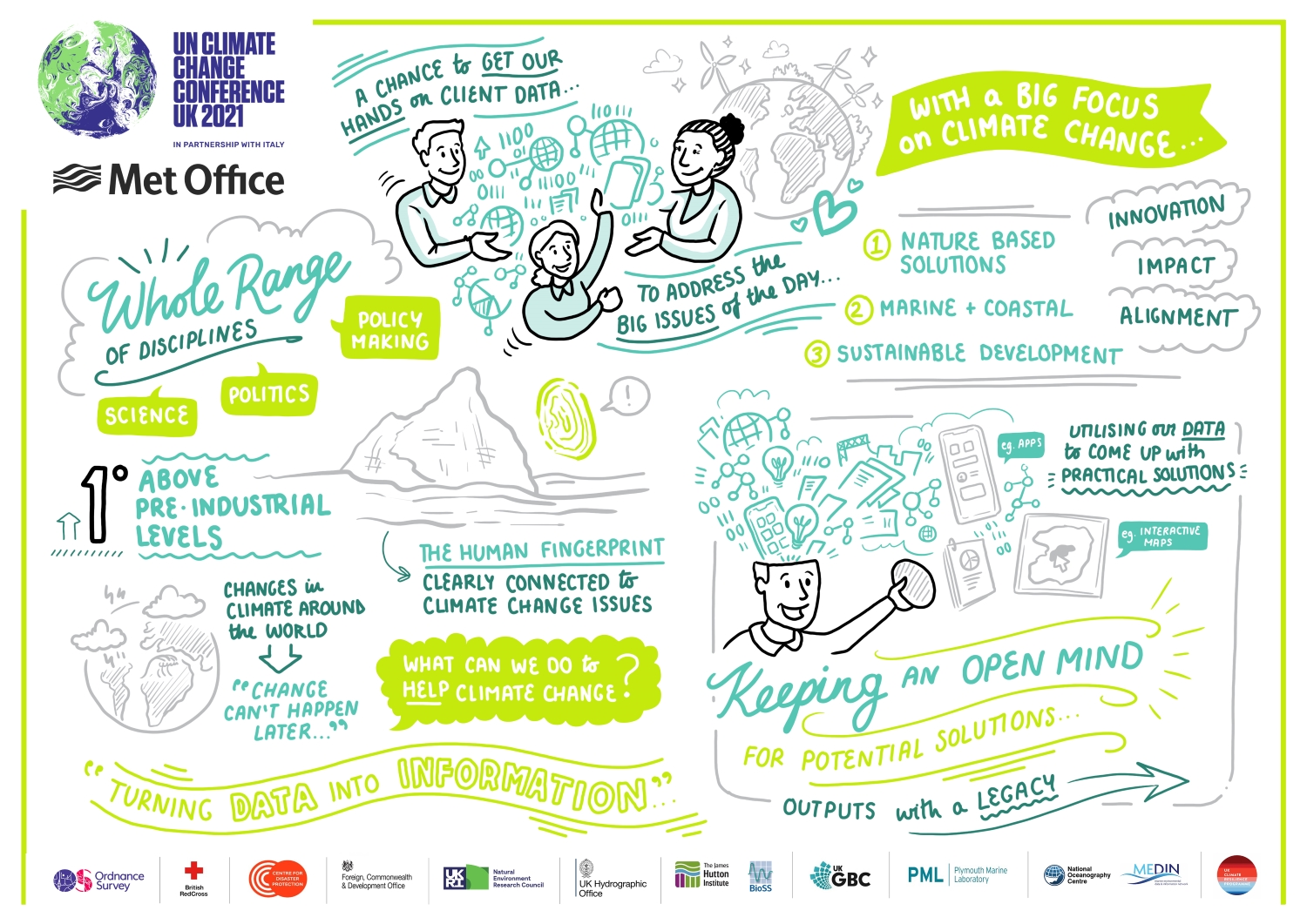As Governments, organisations and individuals around the world seek to tackle the challenges of climate change, creativity and innovation are key to finding ways to improve our resilience to weather and climate.

Our scientists work at the forefront of global climate science, and with the approaching UN Climate Change Conference, COP26, we are stimulating innovation by bringing together a range of skills and information. Working with our partners we have been seeking new and exciting ways to better build solutions for understanding and visualising the risks and potential opportunities posed by a changing climate and the actions we take to manage it.
Our recent Climate Data Challenge virtual hackathon united around 200 participants from academia, other research establishments, Government departments, the Met Office and the private sector, and various disciplines including science, technology and policy. We worked with partners focussing on the challenges that climate change could bring to the following sectors: marine and coastal; nature-based solutions; and sustainable development. For each we invited delegates to tackle these challenges by imagining innovative ways to bring together data and other information.
“Whilst there is a huge amount of climate data available, there is also a vast quantity of other data, and it is through the combination of these that we can gain new insights and understanding,” explains Dr Mark Harrison, Met Office Strategic Head of UK Applied Science. “Through the Climate Data Challenge we wanted to give people from a wide range of disciplines the chance to explore climate resilience in a safe and creative environment.”
Responding to the challenge
Over the two days of this event, 21 multi-disciplinary teams used datasets such as the UK Climate Projections to develop proofs of concept, visualisations and creative solutions to the challenges, generating their own ideas and drawing on expertise from the Met Office and our partners where required.
Responding to the marine & coastal ‘Bridging the gap between our experiences and the science’ challenge, one team explored how to analyse data and communicate climate change through community-sourced storytelling, supplemented by data visualisations and stylised scientific illustrations. You can see the STORY(coast)LINE prototype here.
Meanwhile, the 30 x 30 team took on the nature-based solutions ‘What is the best use for our land?’ challenge. They looked at how we could get to 30% protected land/ocean by 2030 and what the consequences of some of the different choices would be. The progress they made can be seen here.
Hot Stuff was the name of one of the teams tackling the sustainable development ‘supporting the most vulnerable communities’ challenge. They sought to categorise the effect of extreme heat events on power generation and use it to identify countries vulnerable to future climate change. You can see the interface they started to develop here.
An artist from Three Blind Mice developed a series of scribes of the event including to illustrate the outputs for each of the three themes. You can see these by following the hashtag #ClimateDataChallenge.
The legacy
“We were thrilled and inspired by the quality and variety of outputs at the end of the event,” recalls Professor Jason Lowe OBE, Met Office Principal Fellow and Head of Climate Services for Government. “The event illustrated how much insight can be generated by bringing together and visualising data from different disciplines and domain experts, even in a relatively short time.”
In the coming weeks the Met Office organising team plan to meet with some of the teams involved to see how we can support them to continue the work they started during the Climate Data Challenge. We are also exploring ways we can showcase the success of the event at COP26 in Glasgow in order to highlight the importance of using data innovatively to build solutions for climate resilience.

Involving a diverse range of organisations enabled hackathon delegates to benefit from a wealth of experience.
Jason said: “The effects of climate change and variability are already affecting people, and the challenges are likely to increase in the future. Events like the Climate Data Challenge are helping us better understand how society can manage the challenges on local, national and international scales. Avoiding the worst impacts of climate change will be easier with more people tackling the problem and trying to imagine inventive solutions.”
More to come…
Over the next few months, Met Office Academic Partners will also be hosting a series of hackathons. Follow #ClimateDataChallenge to find out more.


